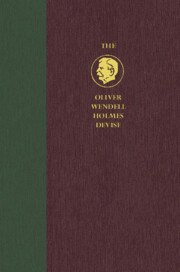Book contents
- The Hughes Court
- The Oliver Wendell Holmes Devise History of the Supreme Court of the United States
- Additional material
- Additional material
- The Hughes Court
- Copyright page
- Contents
- Acknowledgments
- Preface
- Table of Cases
- Introduction
- Part I The Opening Years
- Part II Continuities
- Section A: Administrative Law
- Section B: Civil Liberties and Civil Rights
- Section C: Justiciability
- Chapter 29 Basic Concepts of Justiciability
- Chapter 30 Sovereign Immunity and Political Questions
- Chapter 31 Regulating Access to the National Courts
- Chapter 32 Erie
- Chapter 33 Erie’s Legacy
- Chapter 34 Form and Style in Statutory Interpretation
- Part III New Approaches Begin to Emerge
- Historiographical Essay
- Index
Chapter 31 - Regulating Access to the National Courts
from Section C: Justiciability
Published online by Cambridge University Press: 13 January 2022
- The Hughes Court
- The Oliver Wendell Holmes Devise History of the Supreme Court of the United States
- Additional material
- Additional material
- The Hughes Court
- Copyright page
- Contents
- Acknowledgments
- Preface
- Table of Cases
- Introduction
- Part I The Opening Years
- Part II Continuities
- Section A: Administrative Law
- Section B: Civil Liberties and Civil Rights
- Section C: Justiciability
- Chapter 29 Basic Concepts of Justiciability
- Chapter 30 Sovereign Immunity and Political Questions
- Chapter 31 Regulating Access to the National Courts
- Chapter 32 Erie
- Chapter 33 Erie’s Legacy
- Chapter 34 Form and Style in Statutory Interpretation
- Part III New Approaches Begin to Emerge
- Historiographical Essay
- Index
Summary
Justiciability law deals with the who, when, and where of litigation. The Court addressed the “who” question when it raised questions about the expansive use of class actions in a case seeking to block sales of homes to African American buyers. Other cases dealt with the application of rules waiving any requirement that civil liberties cases in the federal courts have a minimum financial amount at stake and the propriety of federal courts staying their hands in civil rights cases to see what the state courts would do about state law questions bound up with the federal ones. The Court also elaborated on the defition of a “federal question” for purposes of federal jurisdiction. Overall the cases show how substantially Frankfurter’s vision about the limited scope of national judicial power had been accepted by the Court.
Keywords
- Type
- Chapter
- Information
- The Hughes CourtFrom Progressivism to Pluralism, 1930 to 1941, pp. 803 - 850Publisher: Cambridge University PressPrint publication year: 2022

